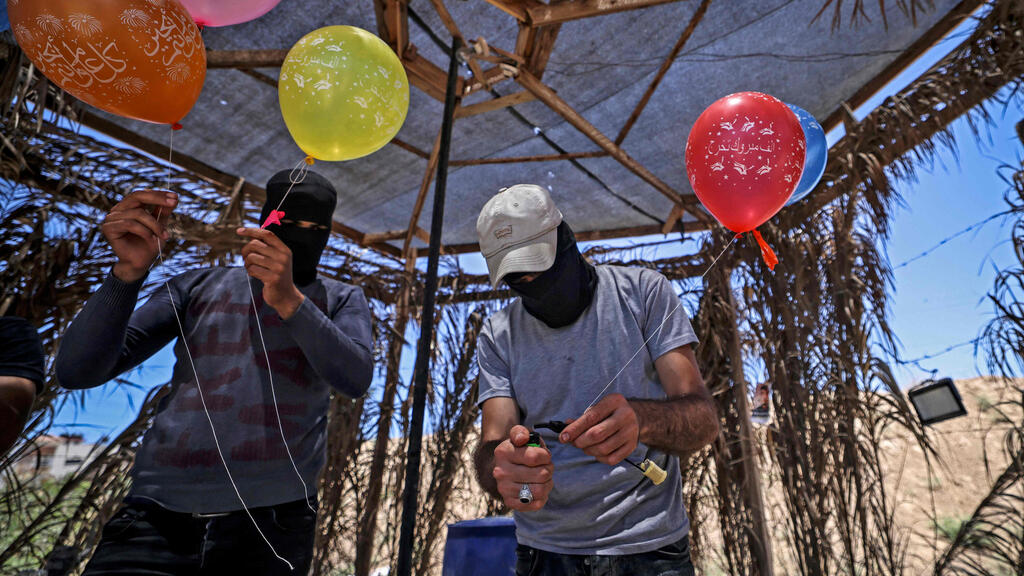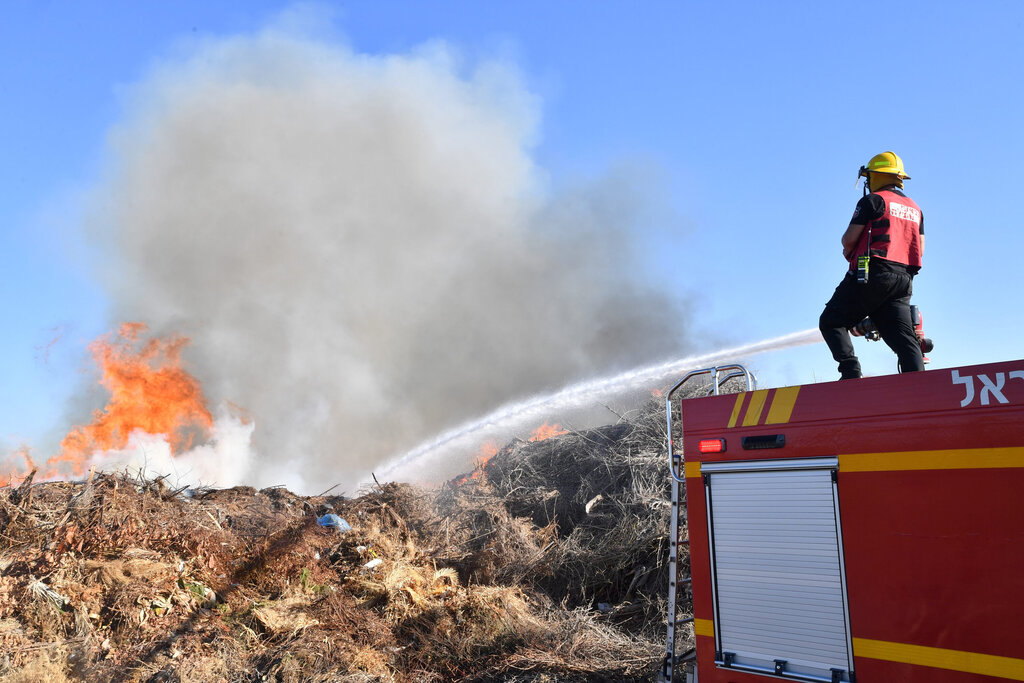Getting your Trinity Audio player ready...
The Hamas terrorist group responded to the nationalistic flag parade through Jerusalem on Tuesday with “just” a few dozen incendiary balloons.
And while such attacks may seem less severe than endless barrages of deadly rockets, Israelis must not see this as a good thing.
5 View gallery


Masked members of Islamic Jihad prepare incendiary balloons to send into Israel from Gaza, June 15, 2021
(Photo: AFP)
Hamas has successfully cast a shadow across the entire country with its constant threats of rocket fire and retaliation against Israel and its civilian population. This is a clear victory for the terrorist group.
According to Yigal Carmon, the president and cofounder of the Middle East Media Research Institute (MEMRI), Hamas’ success is so extensive that it has "managed to limit the IDF's capabilities, and turn every Israeli military victory into another political loss."
The real challenge facing Prime Minister Natali Bennett’s nascent government is to change this worrying paradigm.
5 View gallery


A firefighter battles a blaze caused by an incendiary balloon dispatched from Gaza, June 16, 2021
(Photo: Haim Horenstein)
Currently, the hundreds of thousands of Israelis in the south live in constant fear due to Hamas, with only an occasional reprieve from the rocket fire and arson attacks to provide any comfort and peace of mind.
Apparently though, this dreadful existence is not enough to convince Israel’s decision-makers that they have to deal with the challenge of Hamas.
When Western armies confront organizations such as the Taliban and ISIS, they know it is imperative they avoid harming the civilian population as much as possible.
The IDF must take even more care to avoid civilian casualties, given the fact that every Palestinian child who tragically dies in such confrontations (and even some who do not) eventually winds up on the front page of The New York Times.
5 View gallery


New York Times cover featuring children allegedly killed by Israel in last month's conflict, which required multiple corrections
A French president or German chancellor would never demand that the U.S. halt its operations against the Taliban because of civilian casualties. They are content, however, to do just that when it comes to Israel - and the U.S president may even join them in their demand.
Some might call this discrimination or even anti-Semitism, but it is nonetheless the reality in which we live - and Hamas’ primary power in its war on Israel.
In order to effectively tackle this challenge, Israel cannot return to the policies of former prime minister Benjamin Netanyahu, who allowed Qatar to transfer huge sums to Gaza every month and without oversight.
The issue lies in the fact that Qatar is a state that supports terrorism.
In recent decades, the Gulf nation has transferred billions of dollars to various terrorist organizations all over the world, including Hamas in Gaza.
Allowing Qatar to send money into the Strip is akin to setting the foxes to guard the hen house. Not only will the oil-rich nation never stop Hamas from using the money to arm itself, it even encourages the terrorist organization to spend those funds on developing its industry of death.
Israel and the West must offer to rehabilitate Gaza and aid its people in exchange for the disarmament of all terror factions in the Strip. Israel can even propose that Egypt and the Palestinian Authority take part in these efforts.
5 View gallery


Defense Minister Benny Gatz meeting with Egyptian intelligence chief Kamel Abbas in Jerusalem last month, following the Cairo-brokered truce took effect in Gaza
(Photo: Elad Malka)
And Qatar is most welcome to help, but only through a mechanism overseen by the international community.
Putting an end to the flow of these funds might trigger a fresh confrontation with Gaza’s terrorist factions, but it is better for such a confrontation to take place after Hamas has rejected a joint Israeli-international aid proposal.
It is inarguable that Israeli policy on Gaza has suffered greatly in recent years due to the apparent insanity of the political echelon.
It is now finally the time for Israel to make some sane choices.


